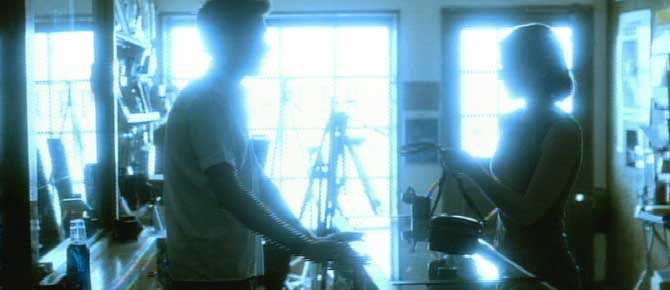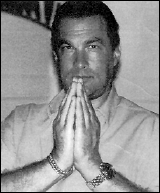 Also at Slate Joshua Clover writes a clever essay (very or too, depending on if those are exhibition posters or actual paintings on your wall) about Richter 858, a luxuriantly produced ode– in book form, with specially commissioned poems and a CD (of Richtermusik, I guess) — to a suite of Gerhard Richter squeegee paintings. Retailing at $125 and co-published by SFMOMA (who have been promised the paintings from an anonymous donor), Richter 858 is a “classic fetish item, beautiful enough that everyone might want it but priced beyond the reach of the great unfunded.” And that’s not the worst of it.
Also at Slate Joshua Clover writes a clever essay (very or too, depending on if those are exhibition posters or actual paintings on your wall) about Richter 858, a luxuriantly produced ode– in book form, with specially commissioned poems and a CD (of Richtermusik, I guess) — to a suite of Gerhard Richter squeegee paintings. Retailing at $125 and co-published by SFMOMA (who have been promised the paintings from an anonymous donor), Richter 858 is a “classic fetish item, beautiful enough that everyone might want it but priced beyond the reach of the great unfunded.” And that’s not the worst of it.
Clover reveals that 858‘s editor, David Breskin, is an SFMOMA Trustee and “almost certainly” the donor of the paintings, facts which–despite a year of SEC reforms and disclosure scandals–go unmentioned in the book. “Whatever a given Richter painting, or a particular poem, might be about, Richter 858 is about checkbooks and culture–that is, it’s a book perfect for decadent modernism, where the art of consumption has replaced the art of production; it’s a book, finally, about collecting, that individualist art overseen by the twin muses ‘Dollars’ and ‘Indulge.'”
“Dollar”: Last time I checked, what a Richter painting’s about, is $400,000 – 1 million, depending on the size and the date. A suite of eight, then, is about, well, you do the math. By making the paintings a “fractional and promised gift” to the museum, our benefactor (let’s call him “DB”) gives a percentage of the title each year for a fixed term ( ex. 10%/year, 10 years), until they belong 100% to the museum. Why do this, O Muse?. “DB” spreads a large tax deduction out over several years, which is useful if his gifts exceed 30% of his adjusted gross income. “Indulge”: “DB” is able to keep the art for a period of time each year in proportion to his percentage ownership.
But there’s another muse’s fingerprints on this one. 858‘s not a catalog, it’s an experience Compared to the essay- and information-packed Richter exhibition catalog written by “The Brain,” (aka, former MoMA curator Robert Storr), Richter 858‘s multimedia melange is a work of the Heart.
“Heart”: SFMOMA says Breskin was “compelled by these works” to create this book. Talking about the project and his interactions with Richter, Breskin’s giddiness (“As a sequence, these hung together and swung in a musical sense,” “I wanted to create an alternative way of engaging with pictures.”) sounds less like a trustee and more like a groupie.
Trust me, that’s what some of the most passionate collectors are, art groupies. Going to concerts (openings), getting backstage (in the studio), obsessing over some lyric (work) and asking arcane questions that betray how powerfully a it inhabits your mind. Groupie? Check out Breskin’s 2-day interview with the Richter of 1987 rock-n-roll, Bono, for Rolling Stone. Breskin seems like the kind of guy–indulgent, clearly, but in a necessary way–who’s trying to live an art-centered life, not just an “art-owning” one. And by placing the Richters at SFMOMA, “DB” seems like the kind of donor who believes that indulgent art experience should always be available to the public (but who agonizes over letting the paintings go too soon).
And besides, 858‘s 30% off at Amazon. A serious collector looks for a discount.












